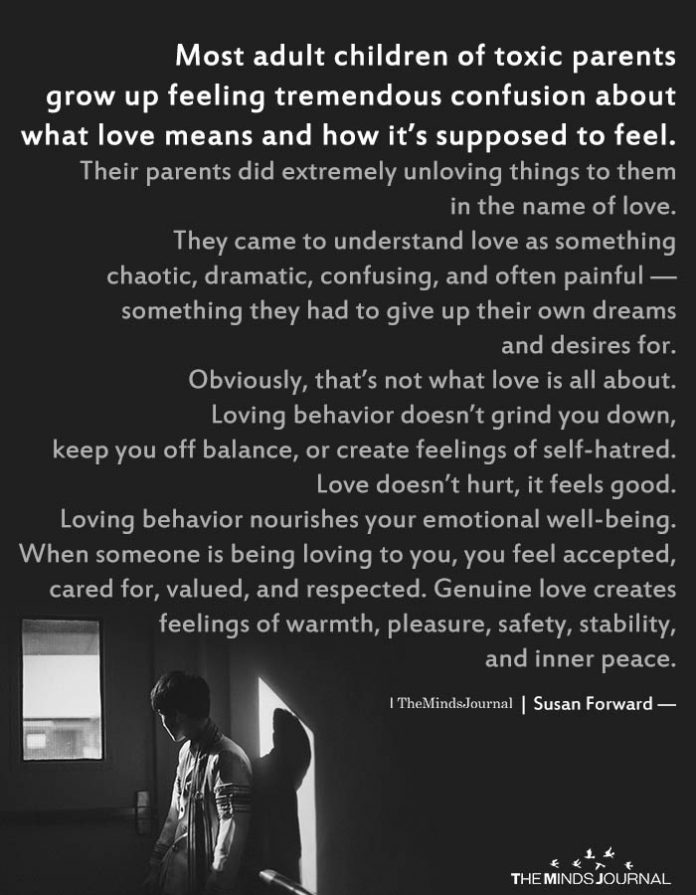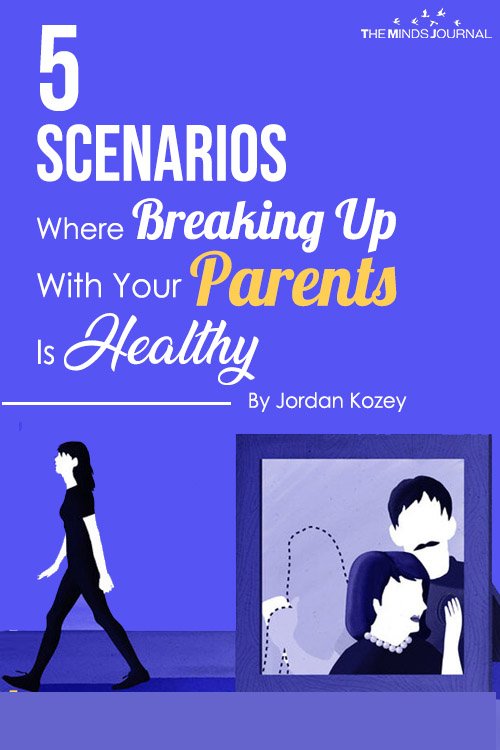You have all the rights to break up with your toxic parents as an adult, even though it might seem selfish. After all, your mental peace and emotional well-being should matter the most, over keeping your ties with your toxic parents.
I want to emphatically state that breaking up with your parents, also known as detaching physically, mentally, and emotionally from the people who made your bodily life possible (or raised you), is a terrible endeavor.
One only hopes (at least) for a set of familiar older bodies who know you and validate you as your shadow and light unfold well into your adult years. Not having that in your life is dreadful.
I also want to affirm that in the infinite expansion of each individual life on the planet, not all parent-child relationships are going to be healthy and validating. Call it ill fate, or shit luck, but poisonous environments and their legions are not above choosing parents or siblings to set siege upon.
Life is irrevocably about living one’s full potential, and sometimes that means parting ways with acrimony and toxicity, even when all the “shoulds” you’ve ever been given on what relationships are “supposed to be” say otherwise. Simply put, venom is venom and should be avoided despite its outward appearance or the input of others.
Note:
Breakups with parents can be permanent, but they do not have to be permanent, and they can also involve contact but in varying degrees. There is no right way to break up with a parent, and each situation is different.
Here are five scenarios where splitting off from your acorn tree, and rolling far, far, and perhaps farther down the hill, may prove beneficial for all.
5 Signs You Should Break Up With Your Toxic Parents For Good
1. You shrink in their presence.
You’re all grown up and you’re on your way. Perhaps your parents have gone through their own transformations and may have responded in ways that are helpful and encouraging. Yet in their very presence, your heart and spirit shrink a size.
You hesitate to tell them all the really exciting things in your life (even though you want to), because it is not met with the same praise as in the company of friends or colleagues. You may find their shortcomings or defects hard to digest.
Being with them for more than a couple of hours leaves you tired, confused, and disoriented. Especially if dissociation occurs, and even looking in their eyes brings deep but subtle drums of panic, you may want to consider a breakup plan. These are most likely moments when you are spreading your wings and taking flight into your own path.
It’s not about them being “bad” per se, but about you maximally thriving. Respect your wing space—make a break.
Related: 4 Signs You Are The Child Of Toxic Parents
2. Conversations involve substances, not substance.
If you have a parent who is a heavy drinker, narcotic user, or even a chain smoker, there is a good chance they will have difficulty seeing you for who you really are. This doesn’t mean they don’t love you, but the use of substances is a good sign that your parent is hiding from some serious pain.
If you try to bring your pain to them, which is a beautiful and enlivening thing to do in healthy situations, the addicted parent will most likely avoid the pain they see in you, beat themselves up for seeing you in pain, or invalidate you outright in an attempt to ward off any distress. After all, they’ve invested so much in their sedation that breaking it would be intense.
If your parent was an addict while growing up, but has since recovered, you may still suffer from the first reason (above) and it may be wise to break up as much as you need in order to feel safe in the world again. You’ve probably invested a lot in finding out what that safety means and how that works for you—keep it up.
3. Your parent(s) wants to spend more time with you than their spouse.
If you haven’t read up on what it means to be a people pleaser, or to be in a codependent/narcissistic relationship, and you are reading this article, then it is time to do so.
If your parent depends on you for emotional support, in any way gets upset when you put your immediate family or personal needs ahead of theirs, threatens to get worse if you are not around, or blames your other parent (behind their back) for all their problems, to you, then it is reasonable to say you may have a narcissistic or codependent parent.
I knew someone once whose mother actually gave them a ring that looked like an engagement ring. Do not let your parents marry you. When you have a parent who has or does live their emotional life through you, the apron strings must be severed.

4. They are, in any way, abusive.
If you’ve ever been beaten by a parent, molested, berated through the use of manipulative and violent words, or been used as a cerebral punching bag, you may always suffer from #1 above. This is a difficult scenario to make a recovery from if this parent is always in your life.
Cutting ties with murky water, as far as I know, has never been an unhealthy endeavour, so long as there are fresh fountains coming from elsewhere.
Abuse is the clearest exit sign we can find in the world of relating.
Related: 12 Signs You Have A Toxic Parent and How To Deal With It
5. They are unable to see the impact of their words or actions, even though you’ve thoroughly, or even tearfully explained it to them.
“How could that upset you?”
“No I saw you, you weren’t sad, you were angry.”
“Yeah well if you would see it from my way you’d understand.”
“You’re scary/strange/messed up etc.”
Imagine yourself expressing a vulnerable state just before you hear any of the above statements from a parent. They may have recently just co-signed a loan on your first house, helped you get that car, or drove several miles to help you out with your newborn, and yet this is what you experience.
This is a tough place to be in. If you try to explain to a parent how their actions and words hurt you, and they cannot, for whatever reason, see where you are coming from, then the distance is necessary.
If you grew up in this environment, chances are you may have found/find yourself in an abusive relationship (see my previous article for how men experience abuse). Your parent may then focus more on what they have already done for you, rather than realize their impact despite their intention.
They remain blind to the rupture in the relational fabric, despite its staring them in the face. If this dynamic continues, you may find your resentment levels piqued, and an odd sense that you are not quite right at your core.
This is the stuff that destroys dreams. You deserve better.
Sometimes, breaking away from toxicity heals the toxic source.
Written by Jordan Kozey Originally appeared in Jordan Kozey
Frequently Asked Questions
How do you deal with an emotionally abusive mother?
Try to identify her abusive behavioral pattern, express your feelings clearly, talk to a relative or a trusted friend, accept the situation, do not seek validation or support from her, and spend as less time with her as possible.
How do you set boundaries with an emotionally abusive mother?
Be specific about your boundary needs and stick to them. Be comfortable with the idea of upsetting her and strictly deal with any violation. Be mindful of what you share with her and never react or argue with them.
How to deal with an emotionally abusive father as an adult?
Realize his abusive nature and strictly set boundaries. Prioritize yourself and never feel guilty for not spending time with him. Let your spouse and other family members know your side of the story.
How common are emotionally abusive parents?
According to a report made by Administration on Children, Youth, and Families, in 2017, 2.3% of children suffered emotional maltreatment in the United States.
How do you forgive a toxic mother-in-law?
Accept her toxic behavior and share your feelings with your spouse. Lay down strict boundaries and stick to them. Be careful of what you share with her but never engage them in an argument.











Leave a Reply